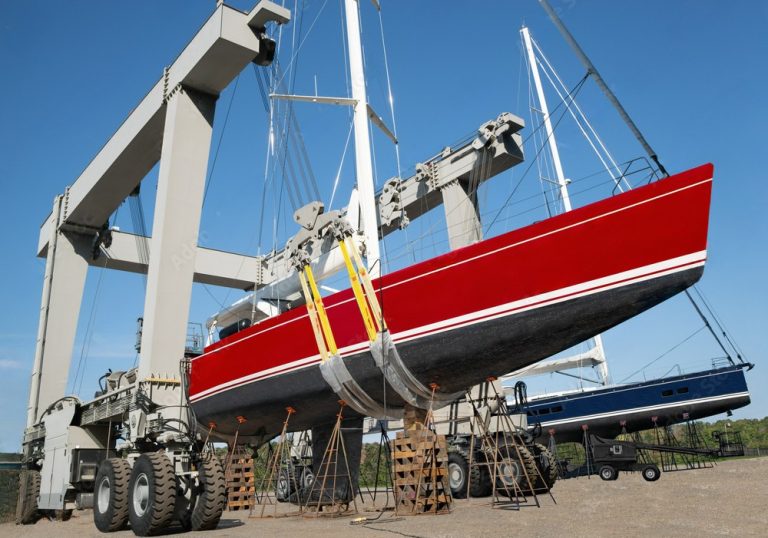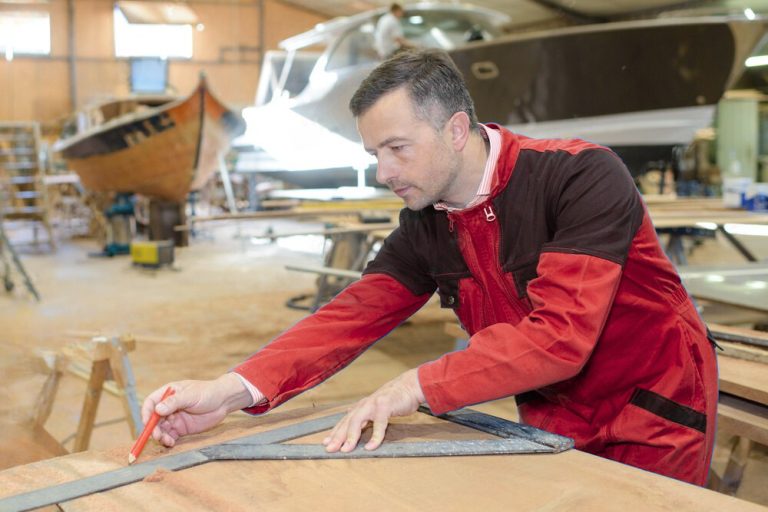
The MEM30719 Certificate III in Marine Craft Construction is a nationally recognised qualification designed to equip students with the technical knowledge and practical skills required to become a skilled tradesperson specialising in the construction, repair, and maintenance of boats. This course focuses on working with materials such as aluminium and steel, covering key aspects of marine craft construction, including fabrication, welding, fitting out internal and external components, and installing engineering drive systems. This qualification prepares students for a rewarding career as a shipwright or boat builder in Australia’s world-class marine industry, known for its high-quality manufacturing standards.
Throughout this course, you will gain skills in:

| Unit Code | Unit Title | Unit Type |
|---|---|---|
| MEM09002 | Interpret technical drawing | Core |
| MEM11011 | Undertake manual handling | Core |
| MEM12023 | Perform engineering measurements | Core |
| MEM12024 | Perform computations | Core |
| MEM13015 | Work safely and effectively in manufacturing and engineering | Core |
| MEM14006 | Plan work activities | Core |
| MEM16006 | Organise and communicate information | Core |
| MEM16008 | Interact with computing technology | Core |
| MEM17003 | Assist in the provision of on-the-job training | Core |
| MEM18001 | Use hand tools | Core |
| MEM18002 | Use power tools/hand-held operations | Core |
| MSMENV272 | Participate in environmentally sustainable work practices | Core |
| MEM07001 | Perform operational maintenance of machines/equipment | Elective A |
| MEM07024 | Operate and monitor machine and process | Elective A |
| MEM12007 | Mark off/out structural fabrications and shapes | Elective A |
| MEM13003 | Work safely with industrial chemicals and materials | Elective A |
| MEM08011 | Prepare surfaces using solvents and/or mechanical means | Elective A |
| MEM25003 | Set up marine vessel structures | Elective A |
| MEM25004 | Fair and shape surfaces | Elective A |
| MEM25007 | Maintain marine vessel surfaces | Elective A |
| MEM25008 | Repair marine vessel surfaces and structures | Elective A |
| MEM25011 | Install marine systems | Elective A |
| MEM25015 | Assemble and install equipment and accessories / ancillaries | Elective A |
| MEM50002 | Work safely on marine craft | Elective A |
| MEM50003 | Follow work procedures to maintain the marine environment | Elective A |
| MEM05005 | Carry out mechanical cutting | Elective B |
| MEM05007 | Perform manual heating and thermal cutting | Elective B |
| MEM05049 | Perform routine gas tungsten arc welding | Elective B |
| MEM05050 | Perform routine gas metal arc welding | Elective B |
| MEM11010 | Operate mobile load shifting equipment | Elective B |
| MEM11022 | Operate fixed/moveable load shifting equipment | Elective B |
| MEM13001 | Perform emergency first aid | Elective B |
| MEM15004 | Perform inspection | Elective B |
| MEM16004 | Perform internal/external customer service | Elective B |
| MEM16005 | Operate as a team member to conduct manufacturing, engineering, or related activities | Elective B |
| Total Number of Core Units | 12 | |
| Total Number of Elective Units | 23 | |
Students enrolling into MEM30719 Certificate III in Marine Craft Construction must meet the following entry requirements:
Upon successfully completing the MEM30719 Certificate III in Marine Craft Construction, graduates can embark on diverse career pathways within the engineering and marine craft construction sectors. Here are potential vocational outcomes and job roles:
Marine Craftsperson
Skilled in the construction, fit-out, and repair of various marine vessels using a range of materials and techniques.
Boat Builder
Build, assemble, and finish different types of boats, ensuring structural integrity, functionality, and design precision.
Shipwright
Specialise in the construction, maintenance, and restoration of ships and large vessels, working with timber, fibreglass, and composite materials.
Marine Fabricator
Fabricate and install metal and composite components used in the construction and repair of boats and other watercraft.
Upon successfully competition of the qualification, graduates can follow the below academic pathways:
MEM40119 Certificate IV in Engineering (Marine Craft Construction)
Develops advanced technical and theoretical skills across multiple engineering disciplines. Ideal for those seeking supervisory or technical roles in marine or mechanical engineering.
* Federation Academy does not offer bachelor-level qualifications.
Tuition Fees (choose one depending on student type):
Onshore Students: AUD $23,500
Offshore Students: AUD $26,000
Other Fees:
Material Fee: AUD $1,500
Application Fee (one-time): AUD $250 (Onshore Students) / AUD $500 (Offshore Students)
*This course has special package pricing when taken as part of a combined qualification. For details on fees, refunds, and academic policies, please refer to the student handbook or contact us.
The vocational work placement component of the course is not a requirement under the training packaging rules for the MEM30719 – Certificate III in Marine Craft Construction course. However, during the course planning and designing phase, the marine craft industry representatives emphasised the critical need for students to complete a dedicated amount of time in a real workplace outside of their learning environment. Industry consultation has confirmed that VWP is a must / mandatory requirement, and all students will need to complete this to successfully achieve the qualification.
The work placement component will complement the practicum assessments completed and must be undertaken within a commercial ship building and repair workshop. This real industry workplace would service customers to industry-realistic expectations. The student may already be in suitable employment or alternatively a suitable work placement will be provided by Federation Academy.
VWP is designed as an unpaid work placement and a part of the academic requirement to successfully achieve the qualification. VWP host employers are free to offer “paid” work placement as per their workplace policies. All students are covered under Federation Academy’s business insurance, while undertaking VWP.
VWP is scheduled as an individual study term (16 weeks) at the end of the course, however students can commence VWP after a minimum of 6 months study. This will be subject to VWP being undertaken outside the scheduled course time table and approval from Federation Academy’s trainer to confirm the student’s vocational competency to commence the VWP.
Work placements are designed to ensure that all required workplace knowledge & skills acquired across all meet the needs of a variety of ship / boat building and repairs.
A logbook will be issued to each student and will be required to complete the required service periods. A shift consists of a minimum of four (4) hours per day (either AM or PM shift). The VWP must be completed and recorded in the VWP logbook issued to students and signed by the immediate supervisor of the business operation.
Prior to placing students into a VWP Federation Academy will assess the suitability of the business operation for VWP. This is to ensure that the workplace has the equipment, as specified in the training package, to meet that of a commercial ship / boat building workshop. In the event the workplace does not have all the required equipment for the VWP purposes Federation Academy will make alternative arrangements with the student.
Once a workplace is deemed appropriate a formal agreement will be entered into with the establishment. This involves the business operation accepting Federation Academy student/s for work placement. The formal agreement will specify the number of shifts the student is required to complete, the type of work that the student can undertake along with the guidelines relevant to employer, student, and Federation Academy. Formal guidelines are developed to ensure all unit and course requirements are addressed.
When undertaking VWP students will have in possession a student guide for VWP that includes information on how to complete the VWP logbook & copy of the work placement agreement / guidelines. Students undertaking work placement will follow timing and uniform requirements according to the workplace’s standards.
The trainer will visit each student on placement a minimum of once every 4 weeks to ensure positive progression. The trainer will discuss the progress of the student with their direct workplace supervisor. In addition to this the trainer will check to ensure logbooks are completed to the required standard and that the student is being assisted and supported as per workplace agreement.
The trainer will have:
The Workplace Facility Provider Formal Agreement (Signed)
The Placement Agreement (Signed)
"Strive for perfection in everything you do. Take the best that exists and make it better. When it does not exist, design it."
Sir Henry Royce